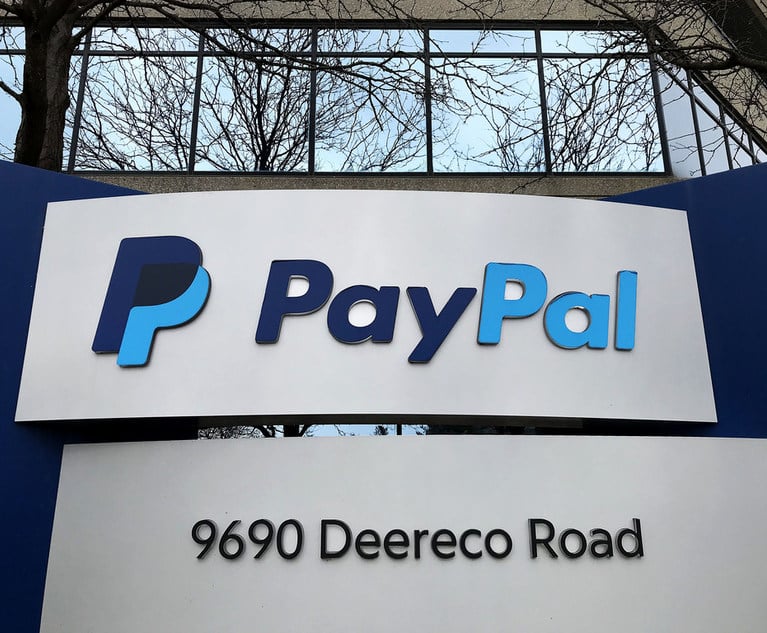California High Court Revives Libel Case Over Confidential, Commercial Reports
The court found the reports in question were "too tenuously tethered to the issues of public interest they implicate, and too remotely connected to the public conversation about those issues, to merit protection under the catchall provision" of the state's anti-SLAPP law.
May 06, 2019 at 03:51 PM
3 minute read
 California Supreme Court building, San Francisco (Photo: Jason Doiy/ALM)
California Supreme Court building, San Francisco (Photo: Jason Doiy/ALM)
The California Supreme Court has revived a trade libel lawsuit brought by online TV streaming service FilmOn against a company that provides information about websites to potential advertisers, which labeled FilmOn a copyright infringer and adult content provider.
A Los Angeles appellate court in 2017 previously affirmed a ruling by a lower court judge dismissing FilmOn's case under California's anti-SLAPP statute, finding that confidential reports that DoubleVerify generated for advertisers labeling FimOn an infringer and provider of “adult content” were constitutionally protected free speech and concerned a matter of public interest.
But in a unanimous opinion written by Justice Mariano-Florentino Cuéllar, the state's high court held that DoubleVerify's reports were “too tenuously tethered to the issues of public interest they implicate, and too remotely connected to the public conversation about those issues, to merit protection under the catchall provision” of the state's anti-SLAPP law.
“In an age of easy public access to previously private information through social media and other means, context allows us to assess the functional relationship between a statement and the issue of public interest on which it touches—deciding, in the process, whether it merits protection under a statute designed to 'encourage continued participation in matters of public significance,'” Cuéllar wrote.
“In giving effect to this statutory purpose, we find that DoubleVerify's reports—generated for profit, exchanged confidentially, without being part of any attempt to participate in a larger public discussion—do not qualify for anti-SLAPP protection under the catchall provision, even where the topic discussed is, broadly speaking, one of public interest,” he wrote.
Reached by email Monday, FilmOn's lawyer Ryan Baker of Baker Marquart said the opinion “restores some reason and balance to the application of the anti-SLAPP statute.” Baker said that court's in the state previously had over-emphasized the state Legislature's directive to interpret the anti-SLAPP law “broadly,” leaving well-funded litigants such as DoubelVerity ”to insulate themselves from liability by connecting the speech or conduct at issue to a matter of public interest in some attenuated way.”
“Today, the Court clarifies that the 'functional relationship' between the speech or conduct at issue and issues of public interest must be considered to determine whether that statement sufficiently encourages participation in matters of public significance to warrant anti-SLAPP protection,” Baker said. “This opinion provides a reasonable framework litigants must now consider before seeking anti-SLAPP protection,” he added.
DoubleVerify's lawyer Lincoln Bandlow, who has left Fox Rothschild to set up his own firm while the case has been pending, was in a deposition Monday and unavailable for comment. Rochelle Wilcox of Davis Wright Tremaine represented a group of amici, including the California News Publishers Association of which The Recorder is a member. Wilcox was out of the office Monday and didn't immediately respond to messages seeking comment.
Read the opinion:
This content has been archived. It is available through our partners, LexisNexis® and Bloomberg Law.
To view this content, please continue to their sites.
Not a Lexis Subscriber?
Subscribe Now
Not a Bloomberg Law Subscriber?
Subscribe Now
NOT FOR REPRINT
© 2025 ALM Global, LLC, All Rights Reserved. Request academic re-use from www.copyright.com. All other uses, submit a request to [email protected]. For more information visit Asset & Logo Licensing.
You Might Like
View All
Microsoft Becomes Latest Tech Company to Face Claims of Stealing Marketing Commissions From Influencers


TikTok Opts Not to Take Section 230 Immunity Fight to U.S. Supreme Court
4 minute read
PayPal Faces New Round of Claims; This Time Alleging Its 'Honey' Browser Extension Cheated Consumers
Trending Stories
Who Got The Work
J. Brugh Lower of Gibbons has entered an appearance for industrial equipment supplier Devco Corporation in a pending trademark infringement lawsuit. The suit, accusing the defendant of selling knock-off Graco products, was filed Dec. 18 in New Jersey District Court by Rivkin Radler on behalf of Graco Inc. and Graco Minnesota. The case, assigned to U.S. District Judge Zahid N. Quraishi, is 3:24-cv-11294, Graco Inc. et al v. Devco Corporation.
Who Got The Work
Rebecca Maller-Stein and Kent A. Yalowitz of Arnold & Porter Kaye Scholer have entered their appearances for Hanaco Venture Capital and its executives, Lior Prosor and David Frankel, in a pending securities lawsuit. The action, filed on Dec. 24 in New York Southern District Court by Zell, Aron & Co. on behalf of Goldeneye Advisors, accuses the defendants of negligently and fraudulently managing the plaintiff's $1 million investment. The case, assigned to U.S. District Judge Vernon S. Broderick, is 1:24-cv-09918, Goldeneye Advisors, LLC v. Hanaco Venture Capital, Ltd. et al.
Who Got The Work
Attorneys from A&O Shearman has stepped in as defense counsel for Toronto-Dominion Bank and other defendants in a pending securities class action. The suit, filed Dec. 11 in New York Southern District Court by Bleichmar Fonti & Auld, accuses the defendants of concealing the bank's 'pervasive' deficiencies in regards to its compliance with the Bank Secrecy Act and the quality of its anti-money laundering controls. The case, assigned to U.S. District Judge Arun Subramanian, is 1:24-cv-09445, Gonzalez v. The Toronto-Dominion Bank et al.
Who Got The Work
Crown Castle International, a Pennsylvania company providing shared communications infrastructure, has turned to Luke D. Wolf of Gordon Rees Scully Mansukhani to fend off a pending breach-of-contract lawsuit. The court action, filed Nov. 25 in Michigan Eastern District Court by Hooper Hathaway PC on behalf of The Town Residences LLC, accuses Crown Castle of failing to transfer approximately $30,000 in utility payments from T-Mobile in breach of a roof-top lease and assignment agreement. The case, assigned to U.S. District Judge Susan K. Declercq, is 2:24-cv-13131, The Town Residences LLC v. T-Mobile US, Inc. et al.
Who Got The Work
Wilfred P. Coronato and Daniel M. Schwartz of McCarter & English have stepped in as defense counsel to Electrolux Home Products Inc. in a pending product liability lawsuit. The court action, filed Nov. 26 in New York Eastern District Court by Poulos Lopiccolo PC and Nagel Rice LLP on behalf of David Stern, alleges that the defendant's refrigerators’ drawers and shelving repeatedly break and fall apart within months after purchase. The case, assigned to U.S. District Judge Joan M. Azrack, is 2:24-cv-08204, Stern v. Electrolux Home Products, Inc.
Featured Firms
Law Offices of Gary Martin Hays & Associates, P.C.
(470) 294-1674
Law Offices of Mark E. Salomone
(857) 444-6468
Smith & Hassler
(713) 739-1250






